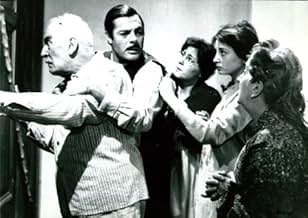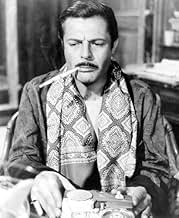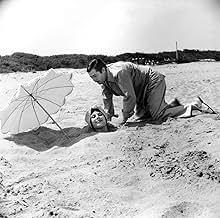NOTE IMDb
7,9/10
15 k
MA NOTE
Un baron sicilien marié tombe amoureux de sa cousine et se jure de l'épouser, mais le divorce étant illégal, il doit élaborer un crime passionnel pour en finir avec sa femme.Un baron sicilien marié tombe amoureux de sa cousine et se jure de l'épouser, mais le divorce étant illégal, il doit élaborer un crime passionnel pour en finir avec sa femme.Un baron sicilien marié tombe amoureux de sa cousine et se jure de l'épouser, mais le divorce étant illégal, il doit élaborer un crime passionnel pour en finir avec sa femme.
- Réalisation
- Scénario
- Casting principal
- Récompensé par 1 Oscar
- 12 victoires et 9 nominations au total
Avis à la une
Definitely a classic film, but not just an Italian classic! "Divorzio all'italiana" centers itself around Ferdinando Cefalù (Mastroianni), a 37 year old baron in a small town. Although he's a baron, his life is not completely perfect as his father has squandered much of their money, and his extremely clingy wife Rosalia stands between him and the only thing he loves, his 16 year old cousin Angela. To add salt to the wound, 1960's Italy does not allow couples to divorce, which leads Ferdinando to seek desperate measures. After a town scandal erupts, when a woman murders her cheating husband to protect her honor, Ferdinando is inspired to set up his wife with a lover in order to kill her and "protect his honor." The rest of the movie chronicles Ferdinando's attempts to find someone who would fit the bill.
"Divorzio all'italiana" is a satirical look at Italian society and its seemingly backward laws which force people to do stupid things and its fallibility at justice. In its social commentary of Italian laws/society, Concini, Germi, and Giannetti (the writers) create well fitted, stereotypical characters that are much needed in order for the message of the film to get across. Ferdinando plays the evil nobleman, Rosalia as the annoying wife, Angela as the desirable secret teen lover, etc. The beauty of the story not only lies in it's scathingly funny humor, with Ferdinando's clever plotting and hallucinations of killing his wife, but also in its ability to transcend time. Nowadays there are no laws that forbid divorce in most societies, but even though that crucial point does not relate to modern audiences, the film is still able to conjure emotions for the characters' plight. Another great thing about the film, is the idea of a protagonist character with typically antagonist characteristics. Ferdinando is definitely a bad man, but the story plays with the audience in making them want Ferdinando to succeed in his plot. To add to the underlying theme of the film, the failure of Italian laws, is the theme of "justice" whether it be from the law or from a simple reversal of fate. Definitely watch the film up to the very end, as it closes with an ironic yet justified twist of fate for the characters involved.
"Divorzio all'italiana" is a satirical look at Italian society and its seemingly backward laws which force people to do stupid things and its fallibility at justice. In its social commentary of Italian laws/society, Concini, Germi, and Giannetti (the writers) create well fitted, stereotypical characters that are much needed in order for the message of the film to get across. Ferdinando plays the evil nobleman, Rosalia as the annoying wife, Angela as the desirable secret teen lover, etc. The beauty of the story not only lies in it's scathingly funny humor, with Ferdinando's clever plotting and hallucinations of killing his wife, but also in its ability to transcend time. Nowadays there are no laws that forbid divorce in most societies, but even though that crucial point does not relate to modern audiences, the film is still able to conjure emotions for the characters' plight. Another great thing about the film, is the idea of a protagonist character with typically antagonist characteristics. Ferdinando is definitely a bad man, but the story plays with the audience in making them want Ferdinando to succeed in his plot. To add to the underlying theme of the film, the failure of Italian laws, is the theme of "justice" whether it be from the law or from a simple reversal of fate. Definitely watch the film up to the very end, as it closes with an ironic yet justified twist of fate for the characters involved.
This classic Italian film is a comedy that tells the story of Ferdinando Cefalu who is unhappily married for 15 years, but he falls in love with his wife's niece, and he starts a plan to end his marriage and not be criticized by the old and classy Italian society. In the meantime, in order to complete his plan many things happened including funny moments and some dramatic moments. The movie seems to have been very well directed and very well acted and gives us a little hint about the behavior of the Sicilian society. In order to do his plan, Ferdinando chooses a crazy idea, and takes a long time to plan and detail his plan perfectly having a lot of funny interruptions during the process of his plan. Its refreshing to find movies with good sense of humor, and no use of vulgarities or bad language to make the viewers laugh. I really enjoyed it, and i deeply recommend watching it.
When I first saw Pietro Germi's movies (a long time ago), I thought he was a misogynist who portrayed women as grotesque monsters that make men's lives miserable. Thirty years later, after the women's movement, I have come around 180 degrees, and see him as a feminist before his time--showing how the patriarchal family destroys women (and men)and exposing the absurdity of "family honor"--and doing it with humor. It doesn't just apply to Sicily. The Sicilian setting and ambiance is a big part of this movie, however--watch for all the little details of gestures and interactions, and the great shots of the sunbaked town, baroque churches, and interiors of the decaying houses of the aristocrats. Mastroianni is terrific, and so is the supporting cast.
This movie got an Oscar for the script (among the others, by Pietro Germi, the gifted director). However, the real importance of this movie can be demonstrated by saying that an entire genre, "la commedia all'italiana" (Comedy, Italian style) is named after this movie.
A major issue of this genre is to make fun of our traditions and culture (I am Italian) despite the radical changes our Country was having during those years ('60s, '70s).
The main issue of Neo-realism (Rossellini, De Sica, Visconti) was to describe the tragic reality of miserable lives after the catastrophic WWII. Then the Italian economic boom of the '50s drove Italy into modernity and wellness. Commedia all'italiana wanted to remind us that despite this modernity we are always the same Italians we were before, with all our intelligence but also with all our defects.
"Divorce, Italian Style" is set in the most 'conservative' place of Italy of that time, where traditions like family honor were still predominant despite all modernity. In the first shots of the movie we see an environment suffocated by the heat of the Sicilian climate. People spend part of the day in their apartments waiting for the cool evening. This motionless environment is highly metaphoric, as it shows that nothing really changes in this land, suffocated by the weight of old traditions. Probably this is not so true today, but at that time certainly was.
However, don't be scared by this introduction. The movie is FUN and it turns into a fast-paced rhythm shortly.
The protagonist loves his cousin and wants to marry her, but he is already married. So he plans to murder the wife, pretending to do that for a 'legitimate' defence of honor. What is amazing is that all the village, all the people in the movie support murder for the honor of the family. They even induce him to kill. And what is sad, is that the law at that time was really soft for those types of murders.
To summarize this movie has these characteristics: 1) VERY FUN. You can't stop laughing even if the script is tragic (this is a characteristic of masterpieces) 2) WELL ACTED: Marcello Mastroianni gives one of his best performances. Stefania Sandrelli is beautiful as ever, Marcello's wife is ugly and a nuisance as her role imposes, and Leopoldo Trieste is another great actor of Italian cinema.
3) WONDERFUL STORY: the script won the Oscar and it is truly very intelligent 4) SOCIALLY COMMITTED: it is an accusation of a wrong law that supports a wrong tradition (the law was changed shortly after).
I give this masterpiece a 10 out of 10, and I strongly recommend it to everyone.
A major issue of this genre is to make fun of our traditions and culture (I am Italian) despite the radical changes our Country was having during those years ('60s, '70s).
The main issue of Neo-realism (Rossellini, De Sica, Visconti) was to describe the tragic reality of miserable lives after the catastrophic WWII. Then the Italian economic boom of the '50s drove Italy into modernity and wellness. Commedia all'italiana wanted to remind us that despite this modernity we are always the same Italians we were before, with all our intelligence but also with all our defects.
"Divorce, Italian Style" is set in the most 'conservative' place of Italy of that time, where traditions like family honor were still predominant despite all modernity. In the first shots of the movie we see an environment suffocated by the heat of the Sicilian climate. People spend part of the day in their apartments waiting for the cool evening. This motionless environment is highly metaphoric, as it shows that nothing really changes in this land, suffocated by the weight of old traditions. Probably this is not so true today, but at that time certainly was.
However, don't be scared by this introduction. The movie is FUN and it turns into a fast-paced rhythm shortly.
The protagonist loves his cousin and wants to marry her, but he is already married. So he plans to murder the wife, pretending to do that for a 'legitimate' defence of honor. What is amazing is that all the village, all the people in the movie support murder for the honor of the family. They even induce him to kill. And what is sad, is that the law at that time was really soft for those types of murders.
To summarize this movie has these characteristics: 1) VERY FUN. You can't stop laughing even if the script is tragic (this is a characteristic of masterpieces) 2) WELL ACTED: Marcello Mastroianni gives one of his best performances. Stefania Sandrelli is beautiful as ever, Marcello's wife is ugly and a nuisance as her role imposes, and Leopoldo Trieste is another great actor of Italian cinema.
3) WONDERFUL STORY: the script won the Oscar and it is truly very intelligent 4) SOCIALLY COMMITTED: it is an accusation of a wrong law that supports a wrong tradition (the law was changed shortly after).
I give this masterpiece a 10 out of 10, and I strongly recommend it to everyone.
DIVORCE Italian STYLE is one of the funniest films I've ever seen on the subject of how to dissolve a marriage--Italian style, of course. Seems those Italians have a way of forgiving murder if the spouse has cheated and is found in the act--which must give rise to some pretty unsavory stories in real life as well as here.
But however unpleasant the subject matter may seem, this is the merriest romp of a comedy I've come across in a long time. It's so artful in the way it gets inside the mind of the impoverished aristocrat (MARCELLO MASTROIANNI) living in palatial ruins in Sicily and desperately devising a way to get rid of his boring wife. He devises a plan that goes awry when "La Dolce Vita" comes to town and, with all the men in the village attending it, his wife takes that opportunity to run off with her lover.
It's a masterful job that Mastroianni does here, giving little signs of distress with a twitch of his mustache, a frown, a concentrated gaze--in other words, bewitched, bothered and bewildered as he contemplates how to go about getting rid of his freedom so he can pursue a young girl he's enamored of. All the events leading up to the final act are hilariously Italiano in style--those little devils knew how to take advantage of the judicial system.
Summing up: A sheer delight from beginning to end, thanks to a masterful job by Marcello Mastroianni in his Oscar-nominated role.
But however unpleasant the subject matter may seem, this is the merriest romp of a comedy I've come across in a long time. It's so artful in the way it gets inside the mind of the impoverished aristocrat (MARCELLO MASTROIANNI) living in palatial ruins in Sicily and desperately devising a way to get rid of his boring wife. He devises a plan that goes awry when "La Dolce Vita" comes to town and, with all the men in the village attending it, his wife takes that opportunity to run off with her lover.
It's a masterful job that Mastroianni does here, giving little signs of distress with a twitch of his mustache, a frown, a concentrated gaze--in other words, bewitched, bothered and bewildered as he contemplates how to go about getting rid of his freedom so he can pursue a young girl he's enamored of. All the events leading up to the final act are hilariously Italiano in style--those little devils knew how to take advantage of the judicial system.
Summing up: A sheer delight from beginning to end, thanks to a masterful job by Marcello Mastroianni in his Oscar-nominated role.
Le saviez-vous
- AnecdotesThe "honor killing" law, which provided mitigating circumstances for anyone who killed his "spouse, daughter or sister" (or their lover) upon discovering them "in illegitimate carnal relations", was definitely abrogated in Italy in 1981, exactly 20 years after the release of this movie.
- GaffesWhen Ferdinando gets in bed with Rosalia after their fight, Rosalia's head facings change significantly between shots.
- Citations
Ferdinando Cefalù: Have you really got another headache?
- ConnexionsEdited into Lo schermo a tre punte (1995)
Meilleurs choix
Connectez-vous pour évaluer et suivre la liste de favoris afin de recevoir des recommandations personnalisées
- How long is Divorce Italian Style?Alimenté par Alexa
Détails
- Date de sortie
- Pays d’origine
- Langue
- Aussi connu sous le nom de
- Divorce Italian Style
- Lieux de tournage
- Ispica, Ragusa, Sicily, Italie(the Cefalus' hometown)
- Sociétés de production
- Voir plus de crédits d'entreprise sur IMDbPro
Box-office
- Montant brut mondial
- 131 467 $US
- Durée1 heure 45 minutes
- Couleur
- Rapport de forme
- 1.85 : 1
Contribuer à cette page
Suggérer une modification ou ajouter du contenu manquant

Lacune principale
By what name was Divorce à l'italienne (1961) officially released in India in English?
Répondre
![Regarder Trailer [OV]](https://m.media-amazon.com/images/M/MV5BY2IwZTI1YmUtNTg4YS00OTNlLTkyYjUtZTE5ZjA5MTc4OGI1XkEyXkFqcGdeQXRyYW5zY29kZS13b3JrZmxvdw@@._V1_QL75_UX500_CR0)


























